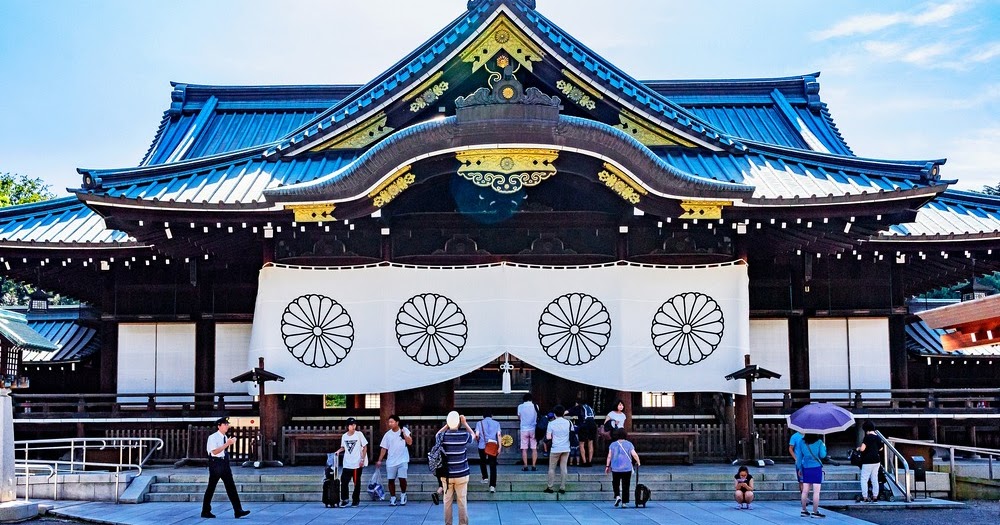写真提供者:Gamo Toshihiro / Flickr
毎年靖国神社では首相が参拝するかしないかで問題になります。
そこで靖国神社について興味を持っている外国の方もたくさんいるはずです。そこで今回は靖国神社の歴史について英語で説明できるようになりたいです。
目次
例文1
靖国神社の起源は、明治天皇の意志により明治2年(1869年)に東京の九段に建立された招魂社と呼ばれる神社にあります。1879年に靖国神社に改名。
明治天皇が1874年1月27日に招魂社を初めて訪れたとき、彼は詩を書きました。この詩で表現されているように、靖国神社は、貴重な人生を自国に捧げた人々の功績を記念し、称えるために設立されました。明治天皇から授けられた「靖国」という名前は、国全体の平和を守ることを意味します。
The origins of Yasukuni Jinja lie in a shrine called Shokonsha, which was established at Kudan in Tokyo in the second year of the Meiji era (1869) by the will of the Emperor Meiji. In 1879, it was renamed Yasukuni Jinja.When the Emperor Meiji visited Shokonsha for the first time on January 27, 1874, he composed a poem: “I assure those of you who fought and died for your country that your names will live forever at this shrine in Musashino.” As expressed by this poem, Yasukuni Jinja was established to commemorate and honor the achievements of those who dedicated their precious lives to their country.
【英単語】
origin : 起源
lie in : (欠点や誤り、理由などの抽象的なものが)…にある、存在する
will : 意志、遺言、遺言書
establish :設立する、創立する、確立する
rename : 新たに命名する、名づける
compose : (詩文を)作る、(曲を)作曲する
poem : 詩、韻文
assure : ~だと断言する、~だと保証する
As expressed by :で表現されているように
commemorate :(祝辞、儀式などを)記念する、祝する
honor : ~を称える
achievement : 功績、偉業、達成
desicate 目的語 to 名詞 : (目的語を)~に捧げる
precious : 貴重な、大切な、尊
例文2
現在、靖国神社には2,466,000以上の神が祀られています。これらは、戊辰戦争、清南戦争、日中戦争、第一次世界大戦、満州事件などの国家危機の間に、1853年以来彼らの国のために究極の犠牲を払ってきた多くの人々の魂です。 、中国事件、および大東アジア戦争(第二次世界大戦)。これらの人々は、階級や社会的地位に関係なく、完全に平等であると見なされ、靖国の由緒ある神として崇拝されています。
Currently, more than 2,466,000 divinities are enshrined here at Yasukuni Jinja. These are the souls of the many people who have made the ultimate sacrifice for their nation since 1853, during national crises such as the Boshin War, the Seinan War, the Sino-Japanese and Russo-Japanese wars, World War I, the Manchurian Incident, the China Incident, and the Greater East Asian War (World War II). These people, regardless of their rank or social standing, are considered to be completely equal and worshipped as venerable divinities of Yasukuni.
【英単語】
Currently : 現在
more than : ~以上の
divinities : 神、神性、神格
enshrine : ~を祀る
ultimateb : 究極の、最終の、最大の
sacrifice : 犠牲、いけにえ
nation : 国家
crisis : 危機、(運命の)分かれ目
war : 戦争
Manchurian : 満州人
Incident : 事件、出来事
regardless of : ~に関係なく、関わらず
consider : ~と見なす
worship : ~を崇拝する、礼拝する
venerable : 由緒ある
例文3
日本の伝統的な信念によれば、故人への敬意と畏敬の念は、死者を生きているかのように扱うことによって最もよく表現されます。そのため、靖国神社では、食事を提供したり、死者に感謝の言葉を捧げたりする儀式が毎日繰り返されています。そして、毎年2回、春と秋に、天皇陛下からの供物を捧げる主要な儀式が行われます。これらの儀式には、帝国の家族のメンバーも参加しています。
このように、靖国神社は皇室と深い関係を持っています。また、戦没者を追悼する中央機関として毎年500万人が参拝しています。
According to traditional Japanese beliefs, respect and awe for the deceased are best expressed by treating the dead in the same manner as if they were alive. Hence, at Yasukuni Jinja, rituals to offer meals and to dedicate words of appreciation to the dead are repeated daily. And, twice every year-in the spring and autumn-major rites are conducted at which offerings from His Majesty the Emperor are dedicated. These rites are also attended by members of the Imperial family.
Thus, Yasukuni Jinja has a deep relationship with the Japanese Imperial family. Also, five million people visit the shrine every year in its function as a central institution for commemorating those who died in wars.
引用元:靖国神社公式ホームページ
【英単語】
According to 名詞 : ~によると
awe : 畏敬の念
deceased : 個人、亡くなった人
express : (言葉で)表現する
treat : ~を扱う
in the same manner as if : まるで~と同じように扱う
Hence : そのため、このゆえに
ritual : 儀式
appreciation : 感謝
rite : 儀式、祭式
conduct : ~を行う
offering : (神への)奉納、献納、奉納物、供物
Majesty : 陛下
attend : ~に参加する、出席する
Thus : このように、したがって
function : 機能
central institution : 中央機関









コメント
コメント一覧 (3件)
Useful information
link Thanks 15372_0
Useful information
Thanks!
–